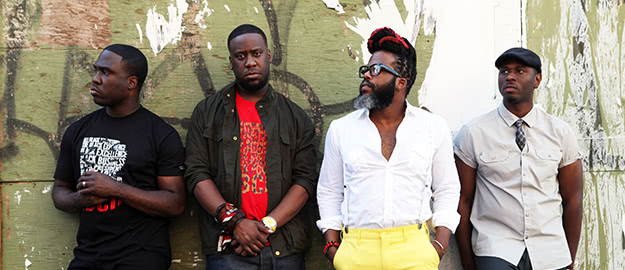Tired of the same old repetitive and disposable anthems that seem to pollute contemporary African-American radio, the Robert Glasper Experiment explored their background in jazz and recruited a number of R&B vocalists and rappers to create a fusion record. Titled Black Radio, it won a Grammy Award in 2012 for Best R&B Album. Ahead of his Australian dates, Robert Glasper looks back on the success of Black Radio and its follow-up, Black Radio 2.
“When I lived in Texas, I didn’t really know much about hip hop music. But when I moved to New York in ’97, I immediately met so many people. I was meeting guys like Q-Tip, Mos Def and Talib Kweli. I got to see the hip hop movement firsthand and it became a community that I was a part of.”
Glasper, a trained jazz pianist, grew up in Houston and regularly performed at church with his mother. After moving to New York to study music at the New School University in Manhattan, he began collaborating with rapper Mos Def. In 2005, he signed to Blue Note Records and recorded two jazz albums,CanvasandIn My Element. His first jazz fusion record,Double Booked(2009), was an innovative album split into two distinctive styles: the first half populated by his post-bop trio, the latter half introducing his new fusion band, the Robert Glasper Experiment. It was the Experiment quartet that enabled Glasper to pursue an investment in hip hop that had enticed him since moving to the East Coast.
“When I moved to the East Coast, I got the chance to befriend and work with a lot of artists, so by the time I signed to Blue Note, one of the guys at the label told me, ‘You know, you could do a record with all the people that you know,’ and I was like, ‘Yeah, let’s wait for that.’”
The wait was certainly worth it, allowing Glasper to recruit a number of talented friends he’d made since leaving Texas.Black Radiofeatured collaborations with Erykah Badu, Lupe Fiasco and Yasiin Bey (AKA Mos Def).
After the unprecedented success of the firstBlack Radio, Glasper was more than ready to make a volume two, finding plenty of willing collaborators in the process. “A lot of people on part two I didn’t know personally. On the first record I literally knew everyone. It was easier on the second to get people I didn’t necessarily know because we won the Grammy for the first one.”
Keeping to the subject of the Grammys; while the win remains an unquestionable honour, I want to ask Glasper if he considered his inclusion in the R&B category an insult, givenBlack Radio’s deliberate swerve away from mainstream urban music. “Not at all. You always have to be in some sort of category. What a lot of people don’t know about the Grammys is that the artist will always choose what category they want to be nominated in. I chose to be nominated for R&B album of the year, as opposed to jazz album of the year.
“Most of the jazz world didn’t really understandBlack Radio. Anyway, a lot of it is not straight-up jazz, it has more of an R&B, hip hop sound. If you’re in the R&B category, you’re on a bigger platform. I wanted to make this album on a bigger platform with a bigger message.”
Robert Glasper Experiment with Roy Ayers atThe Hi-Fi onSaturday March 8.
Black Radio 2out now through Blue Note/Universal.


































